FLAT 10% OFF ON YOUR FIRST ORDER. USE IVER10
Zytanix (Metolazone)
Price range: $180.00 through $450.00
Zytanix Tablet is a potent diuretic containing metolazone, designed to treat fluid retention (edema) and hypertension. It works by increasing urine output to remove excess water and salts, relieving swelling and reducing blood pressure. Ideal for managing edema caused by heart, kidney, or liver conditions, and effective even in impaired kidney function cases.
- Buy 2 and get Flat 15% Off. Use B2SAVE15
- Buy 3 and get Flat 20% Off. Use B3SAVE20
Zytanix Tablet (Metolazone) – Diuretic for Edema & Hypertension Treatment
Zytanix Tablet is a potent thiazide-like diuretic medication containing metolazone, specifically designed to treat fluid retention (edema) and high blood pressure (hypertension). This effective water pill helps eliminate excess fluid from the body through increased urine production, providing relief from swelling caused by heart, liver, kidney, or lung diseases. For optimal results, It should be taken during daytime hours as directed by your physician, preferably with food to minimize stomach upset. Patients are advised to maintain regular monitoring of kidney function and electrolyte levels while on this medication, and never discontinue treatment abruptly without medical consultation.
Uses of Zytanix Tablet:
- Treatment of hypertension (high blood pressure)
- Management of congestive heart failure
- Reduction of edema (fluid retention)
- Prevention of kidney stones
- Adjunct therapy in renal impairment cases
Benefits of Zytanix Tablet:
In Treatment of Edema
The Tablet effectively reduces fluid overload by promoting the elimination of excess water and electrolytes through urine. This action helps relieve uncomfortable swelling in extremities (arms and legs) and abdomen, while improving breathing difficulties caused by pulmonary edema. Patients experience enhanced mobility and comfort in daily activities when fluid retention is properly managed with this medication.
In Treatment of Hypertension
As an antihypertensive, Zytanix Tablet works initially by reducing blood volume through diuresis, and over time by causing vasodilation. This dual action makes it particularly effective for long-term blood pressure control when combined with appropriate lifestyle modifications.
Side Effects of Zytanix Tablet:
Common side effects:
- Headache
- Nausea
- Dizziness
- Blurred vision
- Lightheadedness
Serious but rare effects:
- Severe electrolyte imbalance
- Extreme dizziness/fainting
- Muscle cramps/weakness
- Irregular heartbeat
How to Use Zytanix Tablet?
- Take exactly as prescribed, typically once daily in the morning
- Swallow whole with water – do not crush or chew
- Take with food to minimize gastrointestinal upset
- Best taken early in the day to avoid nighttime urination
- Maintain consistent dosing schedule
How Zytanix Tablet Works?
The Tablet contains metolazone, a quinazoline derivative that acts on the distal convoluted tubules of kidneys to inhibit sodium and chloride reabsorption. This action promotes excretion of water, sodium, chloride, potassium, and magnesium. The drug’s antihypertensive effects stem from this diuretic action initially, followed by reduced peripheral vascular resistance. Unlike some diuretics, It maintains effectiveness even in patients with impaired kidney function.
Safety Advice:
- Alcohol: Strictly avoid – increases risk of dizziness and dehydration
- Pregnancy: Use only if clearly needed after risk-benefit assessment
- Breastfeeding: Not recommended – potential risk to infant
- Driving: Avoid until response is known – may cause dizziness
- Kidney Disease: Requires dosage adjustment and monitoring
- Liver Disease: Use with extreme caution – may worsen condition
What If You Forget to Take Zytanix Tablet?
If you miss a dose, take it as soon as remembered unless it’s nearly time for the next dose. Never take two doses together to compensate. If multiple doses are missed, consult your healthcare provider for guidance.
Drug Interactions:
Zytanix Tablet has significant interactions with:
- Lithium: Risk of lithium toxicity
- Anti-diabetics: May reduce hypoglycemic effect
- Corticosteroids: Increased potassium loss
- Antiarrhythmics: Risk of cardiac arrhythmias
- NSAIDs: Reduced diuretic effect
FAQs:
Q1. Why should I take Zytanix Tablet in the morning?
Taking it early helps prevent nighttime urination disruptions. The diuretic effect typically lasts 12-24 hours, making morning dosing most convenient.
Q2. Can Zytanix Tablet affect my potassium levels?
Yes, it may cause potassium depletion. Your doctor may recommend potassium-rich foods or supplements and will monitor your levels regularly.
Q3. How long before I see results for edema?
Diuresis usually begins within 1 hour, with peak effects at 2-8 hours. Maximum antihypertensive effects may take several weeks.
Q4. Can I take this if I have diabetes?
Yes, but with caution as it may elevate blood sugar. More frequent glucose monitoring may be needed.
Q5. What should I do if I experience severe dizziness?
This may indicate excessive fluid/electrolyte loss. Stop taking the medication and seek immediate medical attention.
| Strength | 2.5 mg, 5 mg |
|---|---|
| Pack Size | 30 Tablets, 60 Tablets, 90 Tablets |

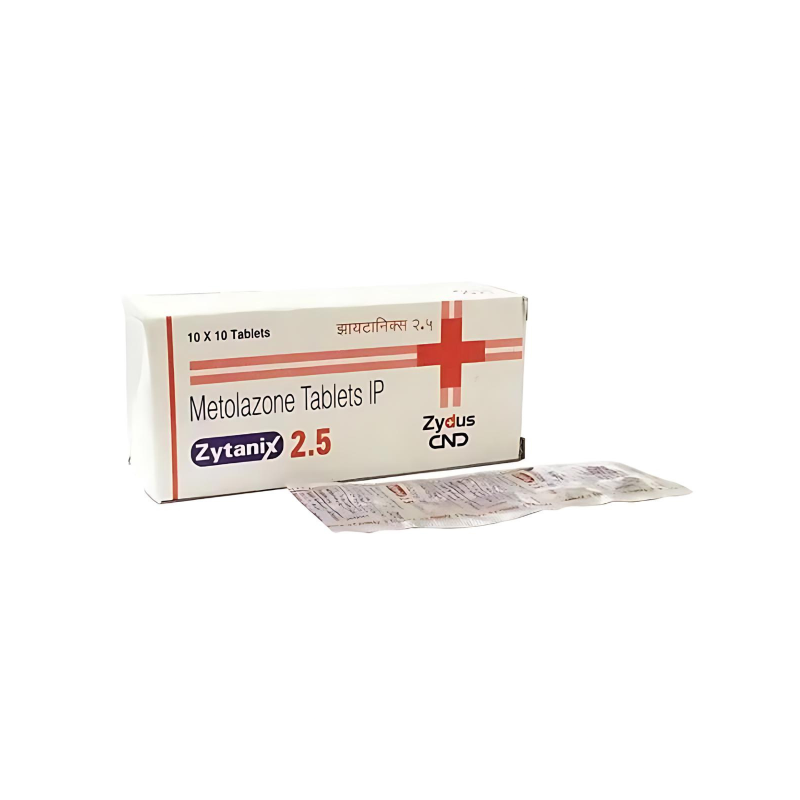


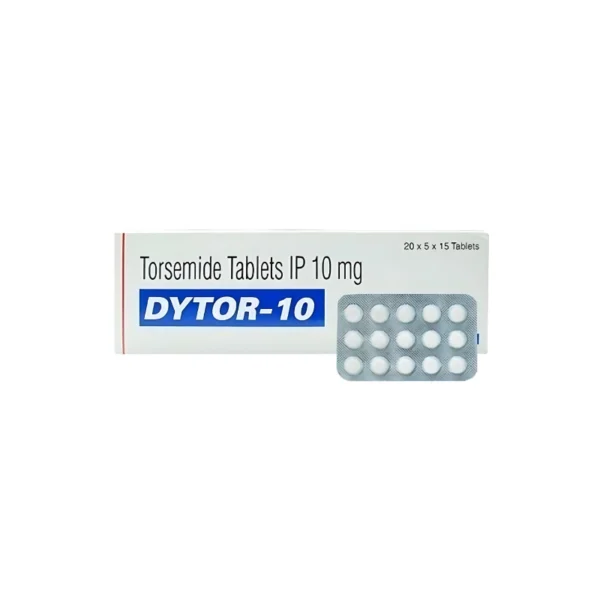

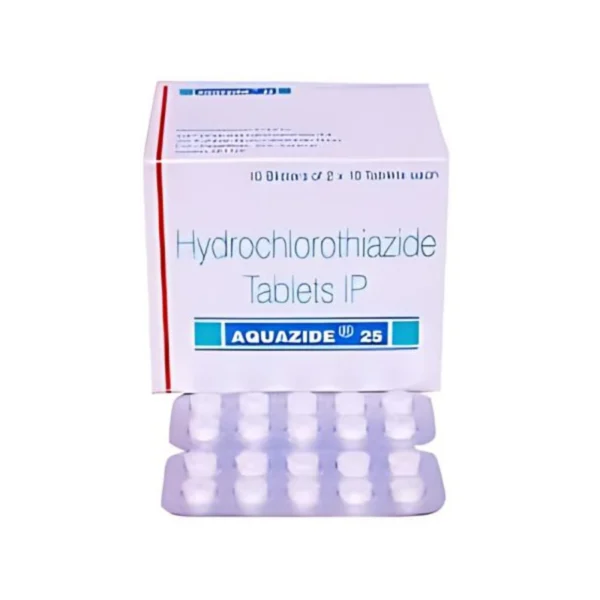
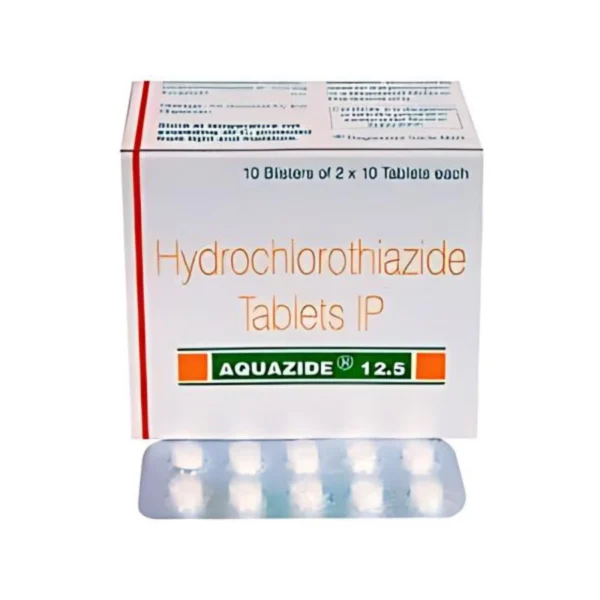

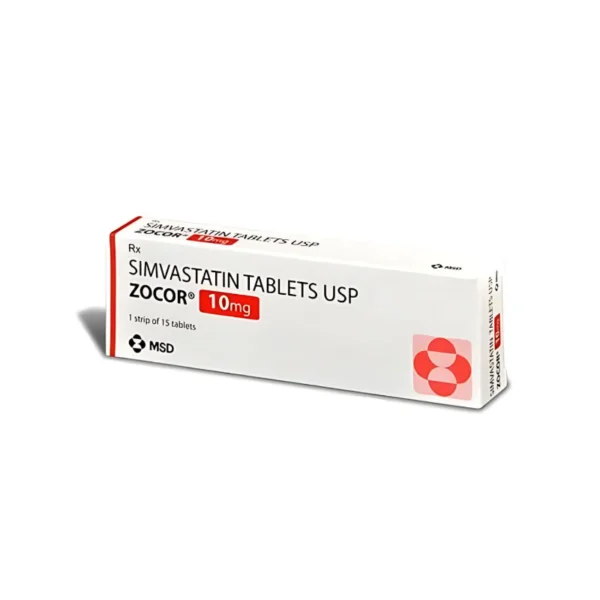
Reviews
There are no reviews yet.